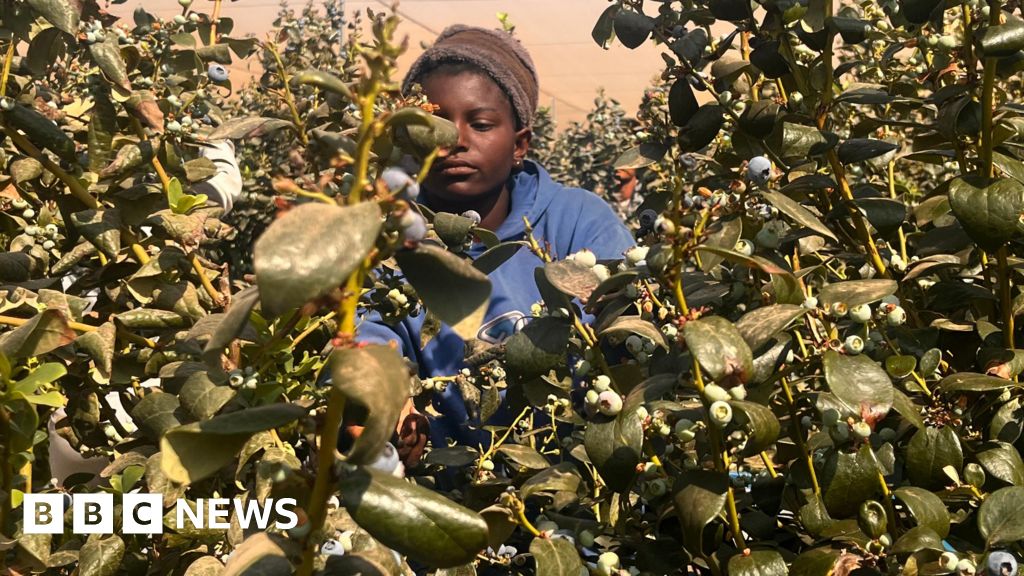Business
Zimbabwe is tobacco country. But some want to switch to a healthier crop – blueberries

Read more on post.
Zimbabwe is Africa’s biggest producer of tobacco but some farmers believe the country’s long-term future could lie in a very different crop – blueberries.
Thanks to a breakthrough in trade talks with China, the world’s biggest importer of the nutrient-rich fruit, Zimbabwe has taken a major step towards achieving its ambition of becoming Africa’s blueberry capital.
Tobacco sales surged to a record $1.3bn (£1bn) last year, helped by the rising number of smokers in China.
In contrast, blueberry exports were worth a more modest $30m but horticulture specialist Clarence Mwale is undaunted.
“The future is food, not a bad habit,” he tells the BBC at his warehouse in Harare.
For the first time, China has agreed to import Zimbabwean blueberries and, crucially, has exempted them from tariffs, in a boost for the southern African state’s struggling economy.
“We have to strike while the iron is hot,” exuberant blueberry farmer Alistair Campbell tells the BBC.
Currently exporting to Europe, the Middle East and South East Asia, farmers like Campbell would be gaining access to a massive new market, once Zimbabwe passes China’s compliance tests on pest and disease control.
A former captain of Zimbabwe’s cricket team, 53-year-old Campbell co-owns a high-tech 50 hectare (123 acres) blueberry farm about an hour from the capital, Harare.
Each of the 240,000 plants on the farm is grown in a pot imported from the Netherlands or South Africa. The pot soil is also imported.
The plants are watered eight times a day, with specially treated water, and the blueberries are kept in refrigerators soon after they are harvested to maintain freshness.
Campbell said that although it was a demanding fruit to grow, the rewards are worth it, especially as global demand is increasing for what some describe as a superfood, with high levels of vitamins and anti-oxidants.
Campbell believes Zimbabwe can cash in on the rising demand, as the fruit comes into season early, in late March, hitting the market ahead of major competitors like Peru.
“It’s all about Peru avoidance,” laughs Campbell.
Peru is both a bitter rival and an inspiration for Zimbabwe’s farmers. In the last 10 to 15 years, it has gone from being responsible for less than 2% of global blueberry production to becoming the largest exporter of the fruit.
Zimbabwe’s production this year is expected to rise by 50% to 12,000 tonnes.
Morocco currently leads Africa’s production with more than 80,000 tonnes in 2024.
South Africa, Zimbabwe’s neighbour, produced 25,000 tonnes.
With South Africa being severely hit by US tariffs, it is looking for new markets for its fruit, with China being an obvious one, especially as it has promised zero tariffs for all African states, except Eswatini because of its close ties with Taiwan.
China has not yet agreed to take South African blueberries, raising hopes among farmers in Zimbabwe that they will enter the lucrative market first.
The Zimbabwean and Chinese governments struck the deal earlier this month, offering what has been described as an “unprecedented opportunity for local producers to access one of the world’s fastest-growing blueberry markets”.
“This agreement is a milestone for Zimbabwe’s horticultural sector,” says Zimbabwe’s Horticultural Development Council executive director Linda Nielsen.
“We now need collaboration to design policies that increase investment, boost production, and ensure our blueberries meet China’s strict quality and phytosanitary standards,” she adds.
Zimbabwe farmers are now looking for capital to boost blueberry production to 30,000 tonnes by 2030.
Expressing caution about whether this can be achieved, Campbell tells the BBC: “It’s all good saying Zimbabwe is open for business but the underlying fundamentals need to be correct.”
Many analysts say that more than 20 years after the government’s controversial land reform programme led to the seizure of many white-owned farms, investors remain uncertain about the security of their land, despite a new law that does away with leases and offers full title to resettled farmers.
With Zimbabwe experiencing a severe cash crisis, exporters are required to surrender almost a third of their foreign-currency earnings to the central bank in exchange for local currency – something that many Zimbabweans are loathe to do, fearing it will lose its value.
Last year Zimbabwe generated $30m (£22.5m) from blueberry exports.
The amount may be modest, but with unemployment high, the jobs the industry creates are welcome. It employs about 6,000 people, mostly women.
“It’s delicate hands that are needed for a delicate fruit,” Rebecca Bonzo, a supervisor at Campbell’s farm, tells the BBC in the Shona language.
“Up to 300 women work during the peak harvesting season. Many are sole breadwinners who can now take care of their families,” she says.
Clarence Mwale – the founder of Kuminda, which represents a collective of small- and medium-scale farmers – says he is pushing more of them to become involved in blueberry farming.
He says he has achieved this with other crops – for instance, about 5,000 small-scale farmers now supply horticultural products, mainly mange touts and sugar snap peas, to the UK and other European markets, something that was unheard of 15 to 20 years ago.
Mwale says he is now looking for about 100 young farmers to diversify into blueberry farming and benefit from China’s decision to open the market to Zimbabweans.
“As the Chinese market opens up…it gives us much more scope,” he tells the BBC. “Where we were scrambling and fighting for the European markets, which we haven’t been able to fulfil, now we have a vast market that we have to fill.
“It gives everyone a chance to get into the blueberry production.”
Zimbabwe has traditionally been tobacco country.
But having fuelled a bad habit in China, it now wants to promote a health food there, hoping in the process to acquire the status of Africa’s blueberry capital.





